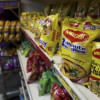Food safety crisis demands immediate attention

The state of food safety in Bangladesh—as reflected in various studies that have detected harmful chemicals in vegetables, fruits, fish, poultry, milk and other food items—remains quite concerning. Recently, two separate studies have again revealed high levels of heavy metals and pesticide residues in vegetables and fruits. Heavy metals were found in red amaranth, also known as laal shak, and some other commonly consumed vegetables such as brinjal, cabbage, cucumber, okra, pointed gourd, and tomato, while pesticide residues were found in about 10 percent of the fruit samples tested. This is alarming as these contaminants can lead to cancer and numerous other health complications.
One of the studies, conducted in six districts of Dhaka and Mymensingh divisions, found a large concentration of cadmium in red amaranth—704.32 micrograms per kilogram—whereas the permissible limit is only 190 micrograms. Lead and cobalt levels were also consistently above the safe limits across all districts. The question is: how mindful are we of what we are eating, really? More importantly, why are existing safeguards against food adulteration not working?
The extent of adulteration and contamination revealed over the years shows just how pervasive this issue has become. For instance, in 2019, research conducted by the Bangladesh Food Safety Authority and a team from Dhaka University found harmful substances such as lead and antibiotics in both pasteurised and raw milk. Studies have also detected excessive levels of microplastics in seafood, trans fat in soybean oil, and antibiotics in poultry. Unfortunately, we are unaware of any effective measures taken by the relevant authorities to prevent these chemicals from entering our food chain. This is unacceptable.
To mitigate the risks posed by contaminated foods, the authorities must devise and enforce effective measures in consultation with experts. Along with ensuring good agricultural practices and providing training to farmers, as well as raising public awareness, it is crucial to prevent food adulteration through stricter regulations. Additionally, improving soil and water quality is essential for safe food production at the farm level. To achieve this, the authorities must halt unplanned industrialisation and pollution of rivers and water bodies which, among other problems, also impact soil quality. In short, a multidimensional approach is needed to ensure food safety in Bangladesh.


 For all latest news, follow The Daily Star's Google News channel.
For all latest news, follow The Daily Star's Google News channel. 










Comments